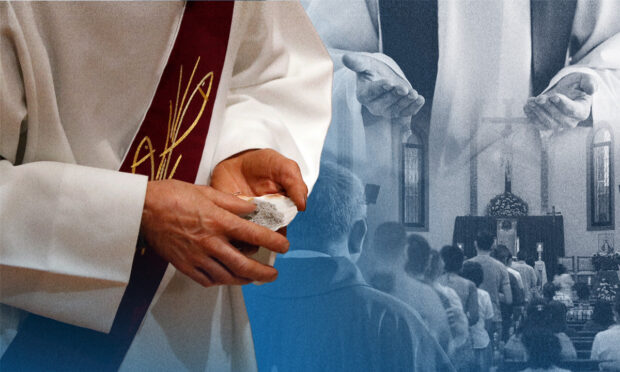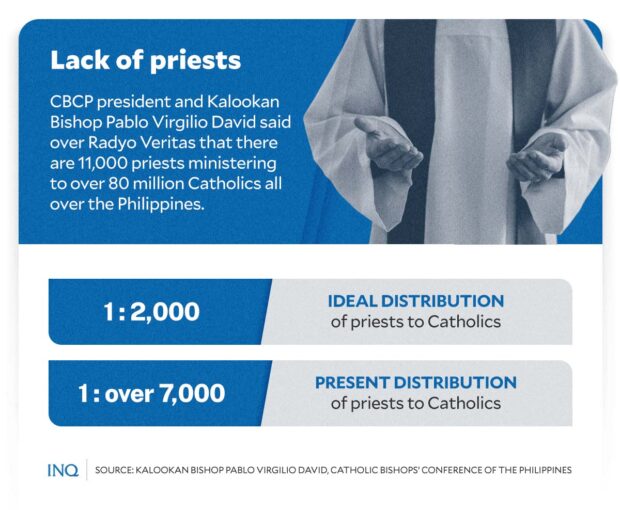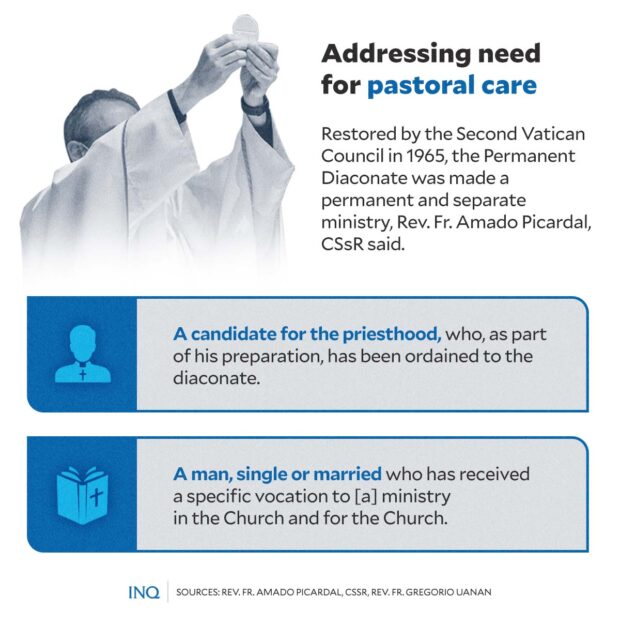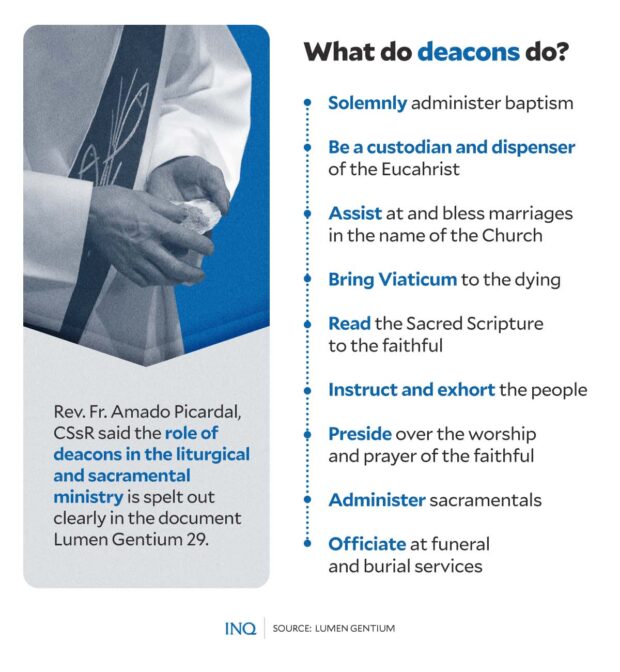Church turning to deacons amid shortage of priests
MANILA, Philippines—With only 11,000 priests ministering to over 80 million Catholics in the Philippines, the need for pastoral care, especially in barangays, or Basic Ecclessial Communities (BECs), is clear.
This was seen firsthand by Rev. Fr. Myke Dacalos, MSC.
As the Catholic Bishops’ Conference of the Philippines (CBCP) said, ideally, there should be one priest for every 2,000 Catholics, but based on data provided by CBCP president and Caloocan Bishop Pablo Virgilio David, the present distribution is 1: over 7,000.
Dacalos said in his first year as a priest, he was assigned to his congregation’s mission parish in San Luis, Agusan del Sur province. There, he served more than 30 BECs, including indigenous communities.
He told INQUIRER.net that San Luis, which has a population of almost 40,000, is one of their congregation’s farthest mission areas, but stressed that all Catholics, not only those living in far-flung communities, need pastoral care.
Article continues after this advertisementRELATED STORY: PH Catholic Church badly needs priests for growing flock
“Having been active in social media, I have had encounters with people from all walks of life, especially among young professionals and members of the LGBTQIA+ community, who reached out and expressed their longing for pastoral care,” he said.
Article continues after this advertisementThis, Rev. Fr. Gregorio Marvic Uanan said, could be the reason the CBCP requested the establishment of a Permanent Diaconate in the Philippines. “I surmise [it] is for pastoral reasons,” he told INQUIRER.net.
It was stressed by Dacalos that “although the Philippines is considered a ‘Catholic’ country, especially in numbers, this fact also presents the pastoral issue of the limited number of priests vis-à-vis the overwhelming number of Catholics.”
RELATED STORY: PH remains Asia’s Catholic bulwark
David had stressed over Radyo Veritas the significance of having permanent deacons, saying that even while they are engaged in secular life, “we can deploy them in mission centers or stations as chaplains.”
Last Tuesday (Sept. 12), the CBCP announced that its request has already been granted, with the Vatican saying that Pope Francis is one with the Philippines in praying that “this noble initiative for the good of the holy people of God” will yield results in the years to come.
‘Permanent, separate ministry’
Uanan, judicial vicar of the Diocese of Ilagan, who studied at the Pontifical University of St. Thomas Aquinas – Angelicum in Rome, said there are two types of deacons—transitional and permanent.
“A transitional deacon is a candidate for the priesthood, who, as part of his preparation, has been ordained to the diaconate. A permanent deacon is a man who has received a particular vocation to ministry in the Church and for the Church,” he said.
Rev. Fr. Amado Picardal, CSsR, said in a column that it was in 1965 when the Second Vatican Council “restored the Permanent Diaconate in the Catholic Church.” This indicated that the diaconate is no longer simply a transitional state before the ordination to the priesthood.
“[It is] a permanent, separate ministry,” he said.
Picardal said currently, permanent deacons are found mostly in North America and some parts of Europe and Australia, like Canada, where there are already six permanent deacons, based on a report by the Philippine Asia News Today.
“Finally after 50 years since its restoration, the CBCP has decided to send a petition to Rome for the ordination of permanent deacons. This is a welcome development and long overdue,” he said.
‘Distinct’ vocation
The Archdiocese of Vancouver, where the ministry is already established, explained that “the permanent diaconate is not a lesser version of the priesthood, but a unique vocation unto itself.”
RELATED STORY: Many Filipinos becoming Catholic deacons in Vancouver
For Dacalos, Permanent Diaconate is a “distinct ministry for some good reasons”:
- It is open to married men and widowers
- Candidates who will be ordained will remain deacons for the rest of their lives
- Compared to transitional deacons who are actually preparing for ordination to the priesthood, permanent deacons have more opportunities to realize the very important role of a deacon in the Christian community, like “taking care of the needs of the poor and the needy.”
The Permanent Diaconate can be conferred on a single or married man but with the consent of the married man’s wife. “Once ordained, a man may not marry. Both men who are single at ordination and deacons who are widowed after ordination have an obligation to celibacy,” the Archdiocese of Vancouver said.
“The deacons concretize the model of the Church as servant and the Church of the poor,” Picardal said, adding that “the servant mission is not limited to acts of charity but involves the work of integral development – for justice, peace, development and the integrity of creation.”
He said: “Thus, social action is the primary responsibility of deacons.”
As context, Dacalos explained that “the diaconal ministry emerged as a pastoral response of the early Christian community to the concrete need to care for the poor and the widow (cf. Acts 6:1-6) who were then unintentionally neglected in terms of the distribution of food, a logistical problem within a growing community.”
“The Apostles desired to focus on preaching and prayer. They then instructed the early Christians to select among themselves “seven men of good standing, full of the Spirit and of wisdom” (Acts 6:3) whom they appointed to the task of taking care of the material needs of the poor and the needy,” Dacalos said.
Regarding the minimum age, the Code of Canon Law prescribes that: “The candidate for the permanent diaconate who is not married may be admitted to the diaconate only when he has completed at least his 25th year; if he is married, not until he has completed at least his 35th year”.
Ministering to people’s needs
But how is the ministry of the Permanent Diaconate to be understood in the context of the Philippines? “This requires a lot of reflection,” said Picardal, a missionary priest of the Congregation of the Most Holy Redeemer.
“Like that of the bishops and priests, the ministry of deacons is a participation in Christ’s priestly, prophetic and kingly mission. It is a ministry of the liturgy (priestly), a ministry of the word (prophetic), a ministry of charity and administration (kingly),” Picardal said.
He said the role of deacons in the liturgical and sacramental ministry is spelled out clearly in the document Lumen Gentium, which was solemnly promulgated by Pope Paul VI on Nov. 21, 1964:
- Solemnly administer baptism
- Be a custodian and dispenser of the Eucahrist
- Assist at and bless marriages in the name of the Church
- Bring Viaticum to the dying
- Read the Sacred Scripture to the faithful
- Instruct and exhort the people
- Preside over the worship and prayer of the faithful
As Dacalos pointed out, “permanent deacons, therefore, will be able to assist in addressing these pastoral needs within the community,” saying that “for some decades now, lay liturgical leaders have been helpful in addressing the pastoral needs of local parishes.”
“The permanent deacon’s ministry of administration can be applied in the building up and nurturing of basic Christian communities especially those far from the central parish, and/or, in the absence of a parish priest, a permanent deacon may exercise pastoral care and leadership as parish administrator,” he said.
As to how one can become a permanent deacon, Uanan said the CBCP will still have to work on the “Norm on Permanent Diaconate,” but what is certain, Dacalos said, is that candidates will undergo the needed psychological, spiritual, pastoral, and academic formation.



